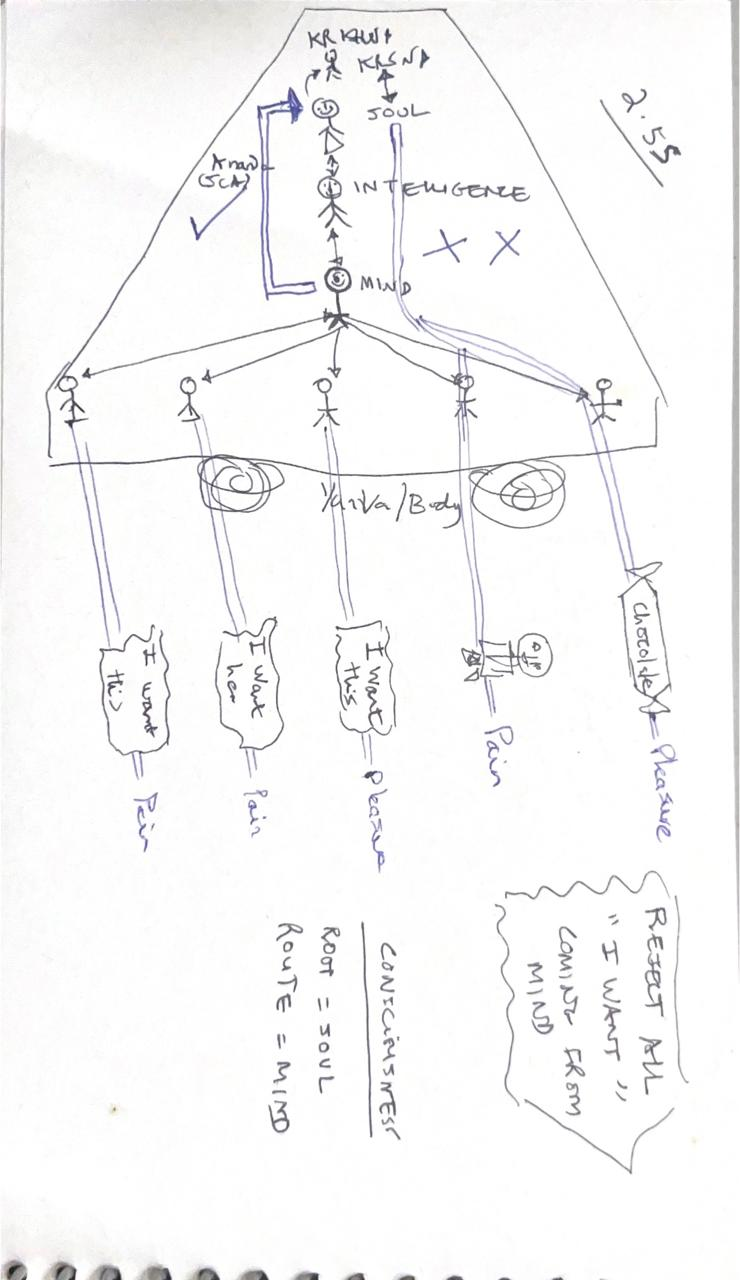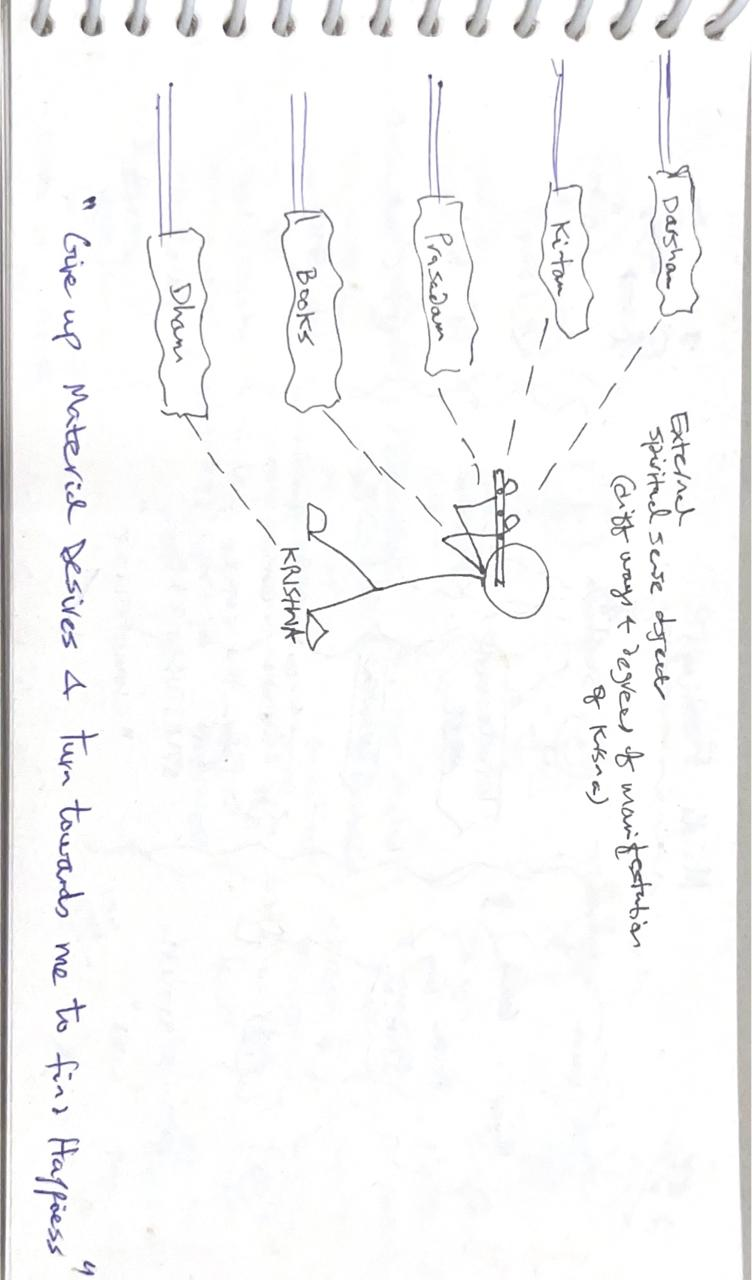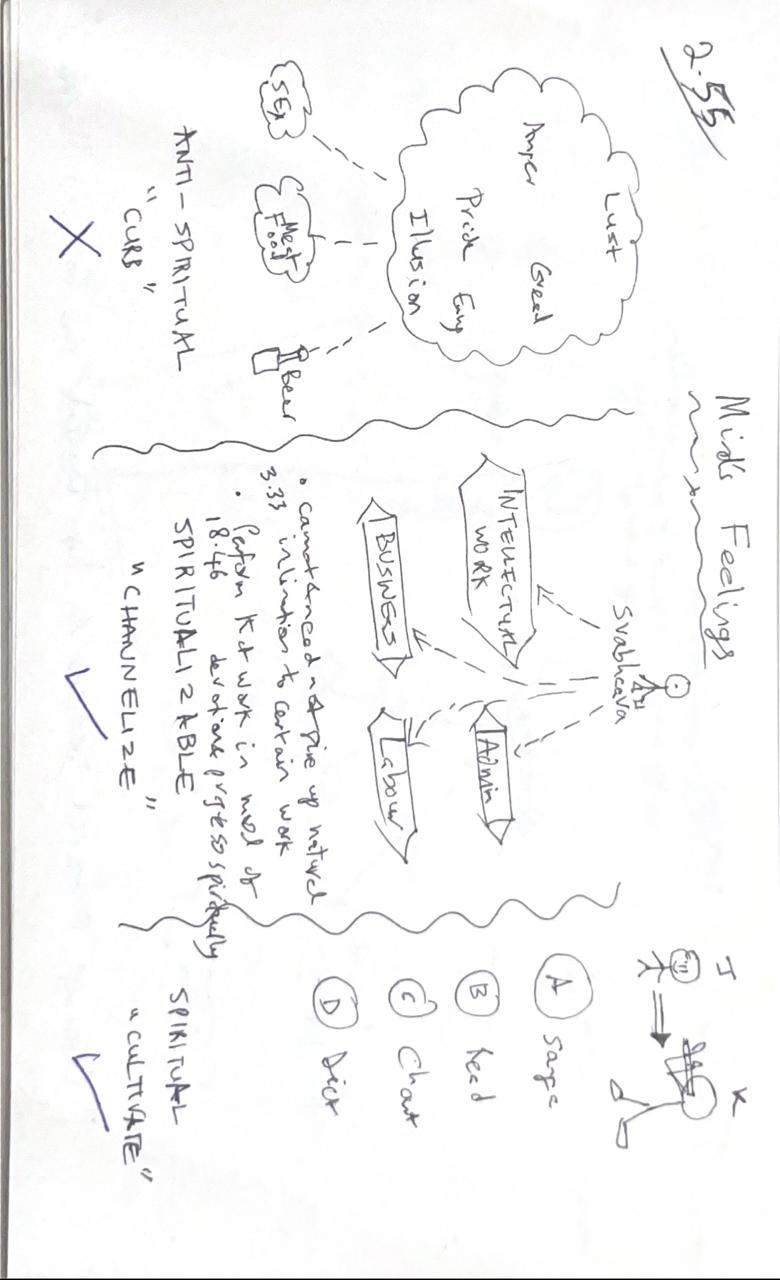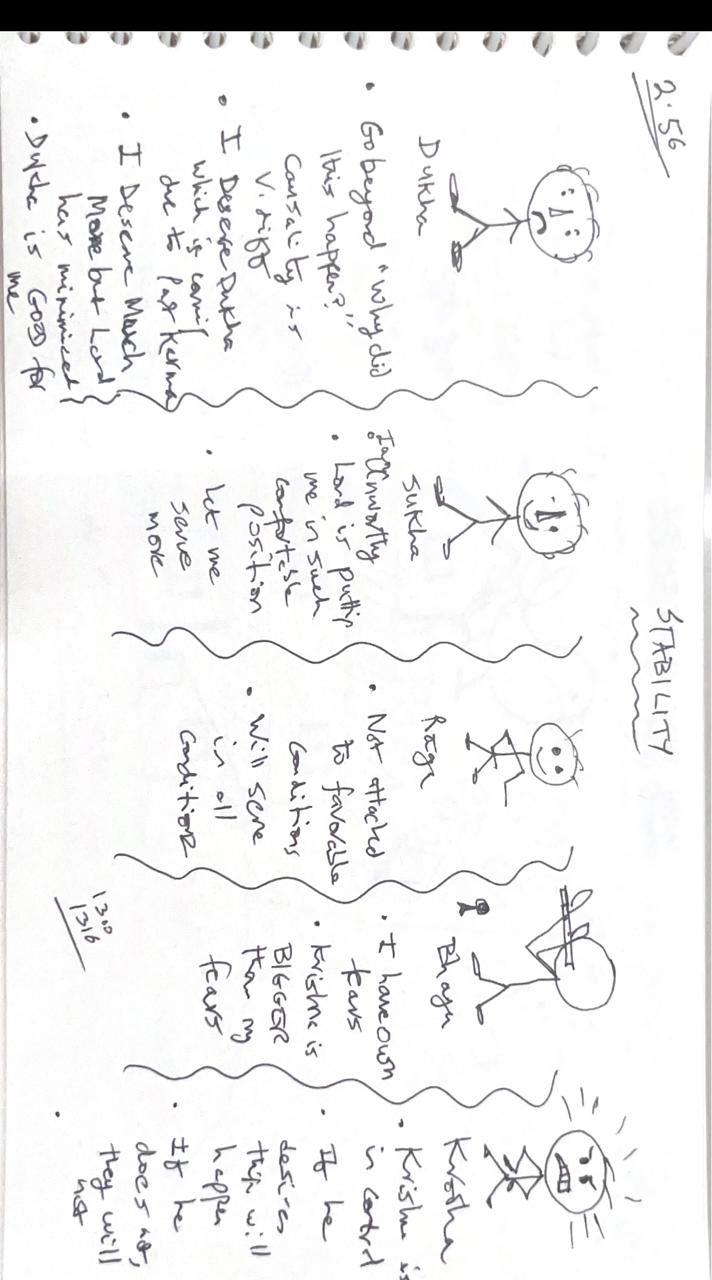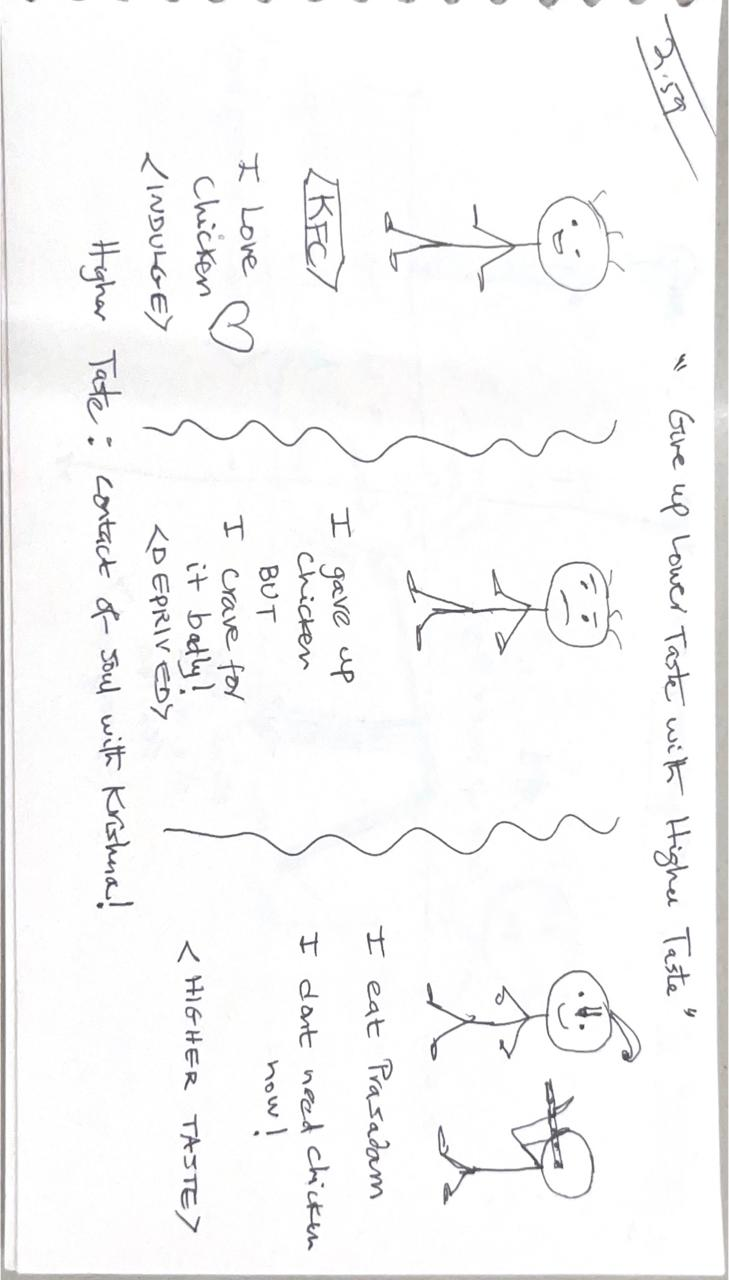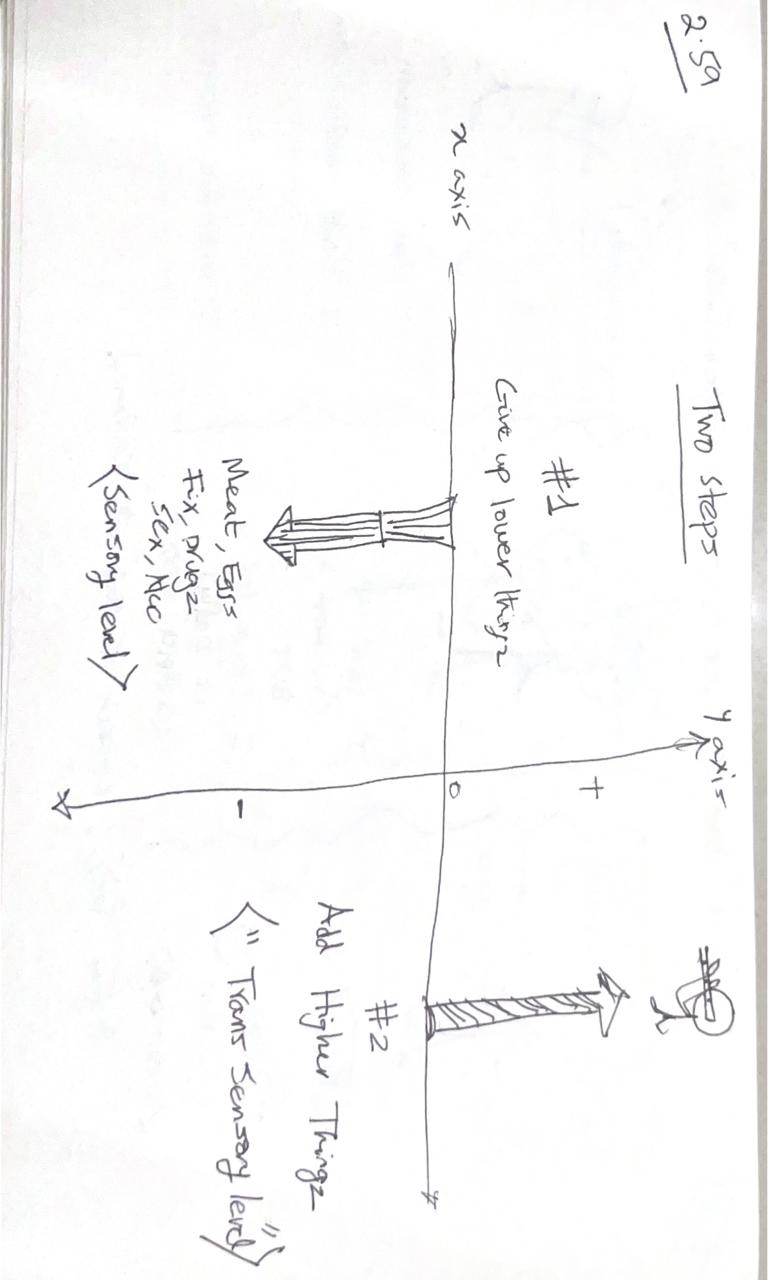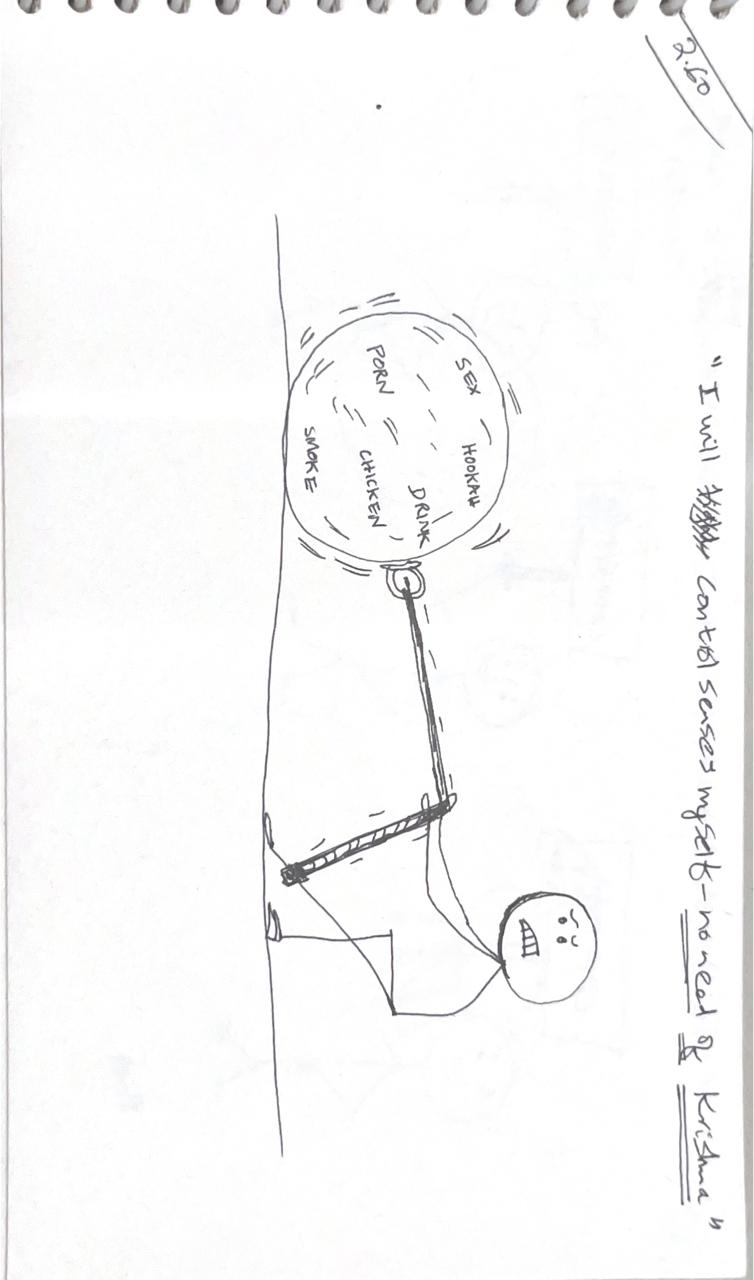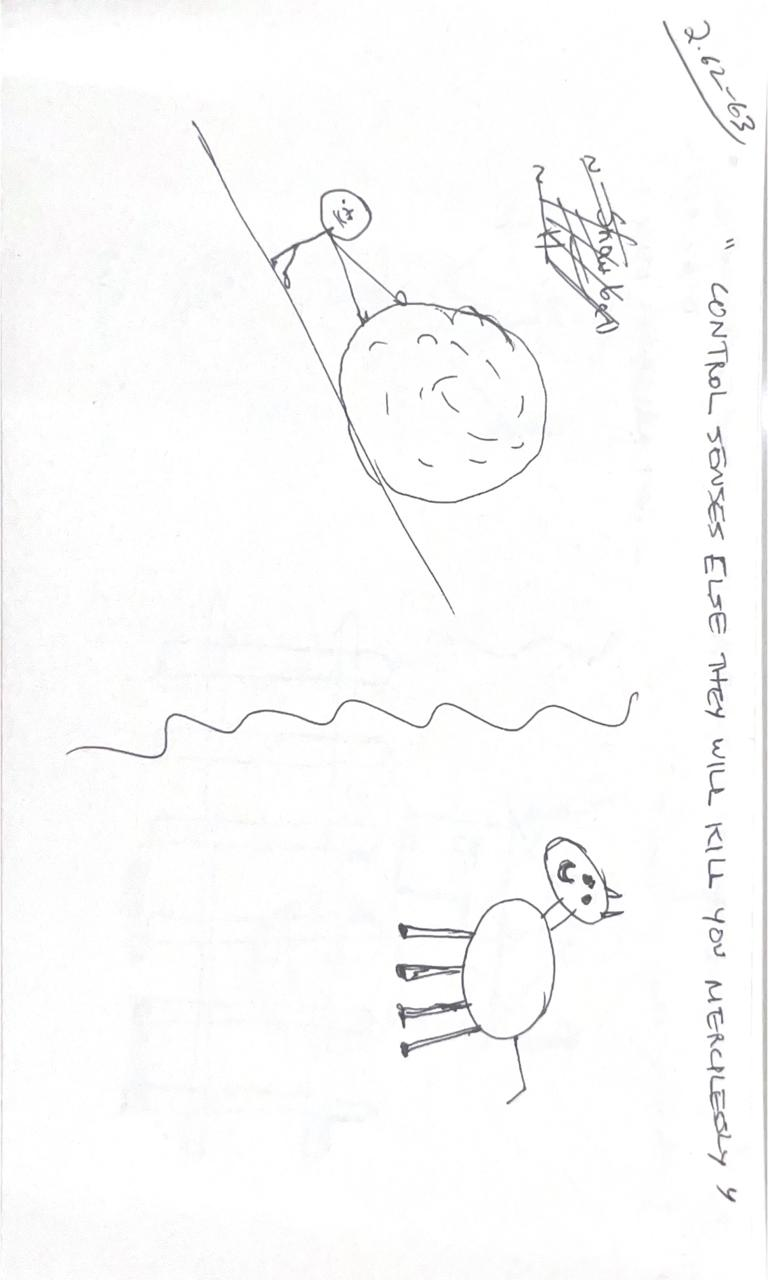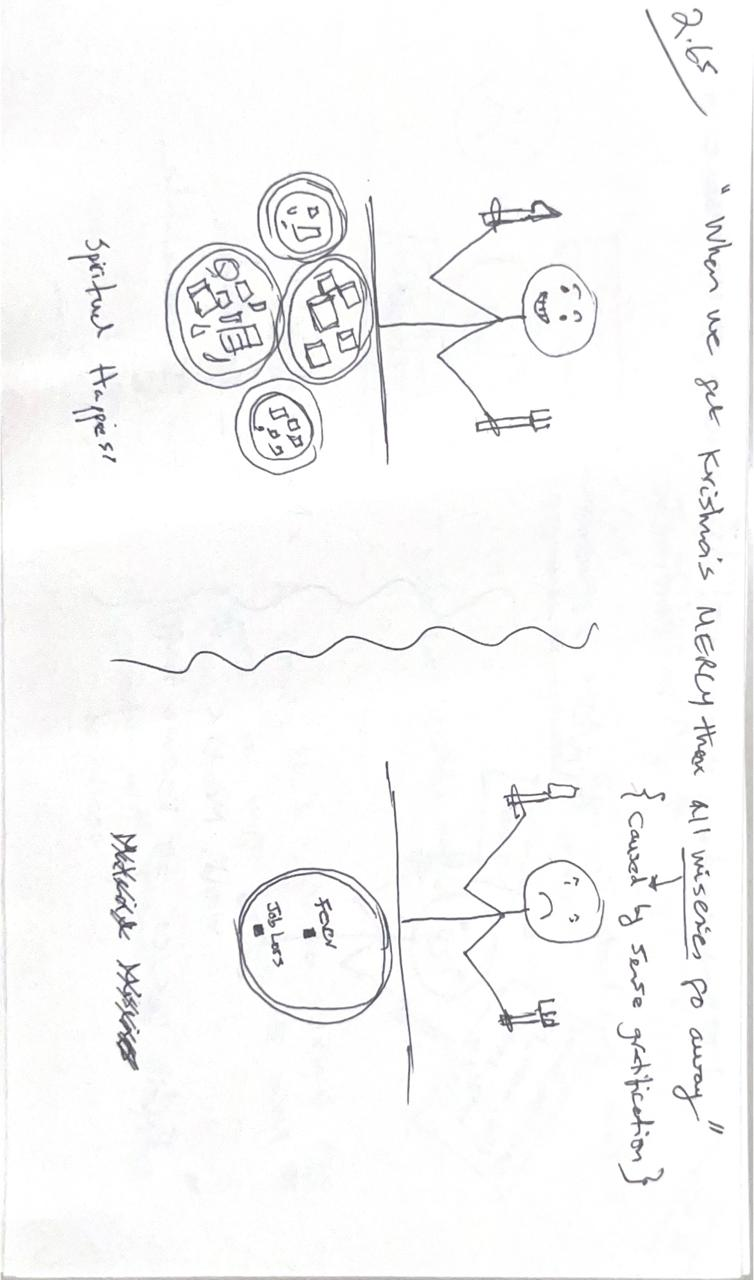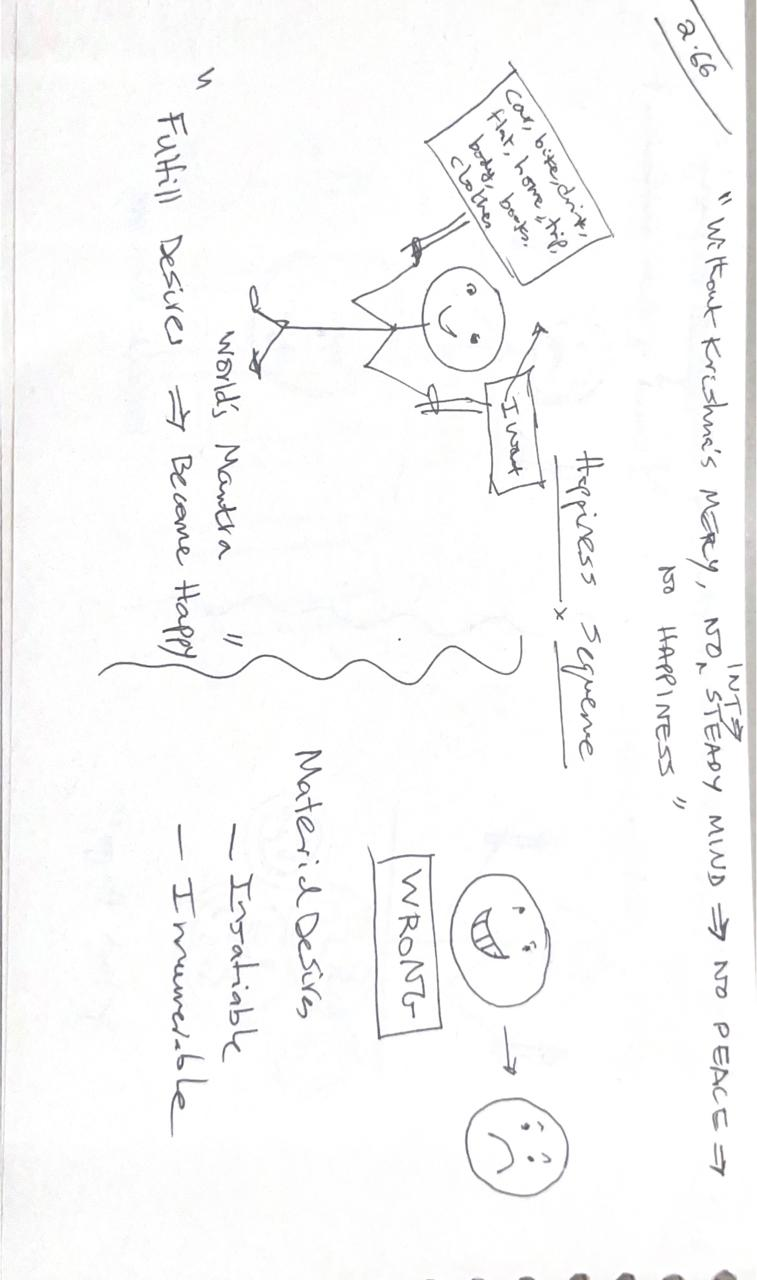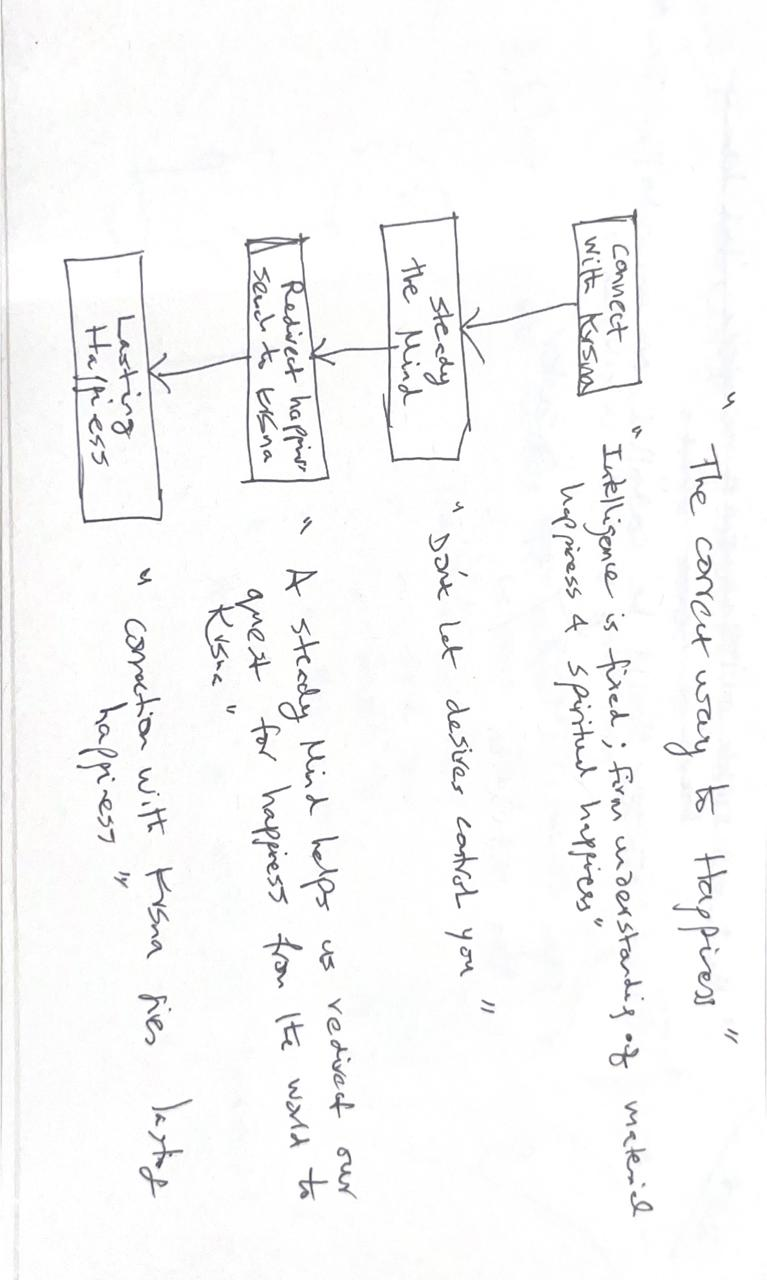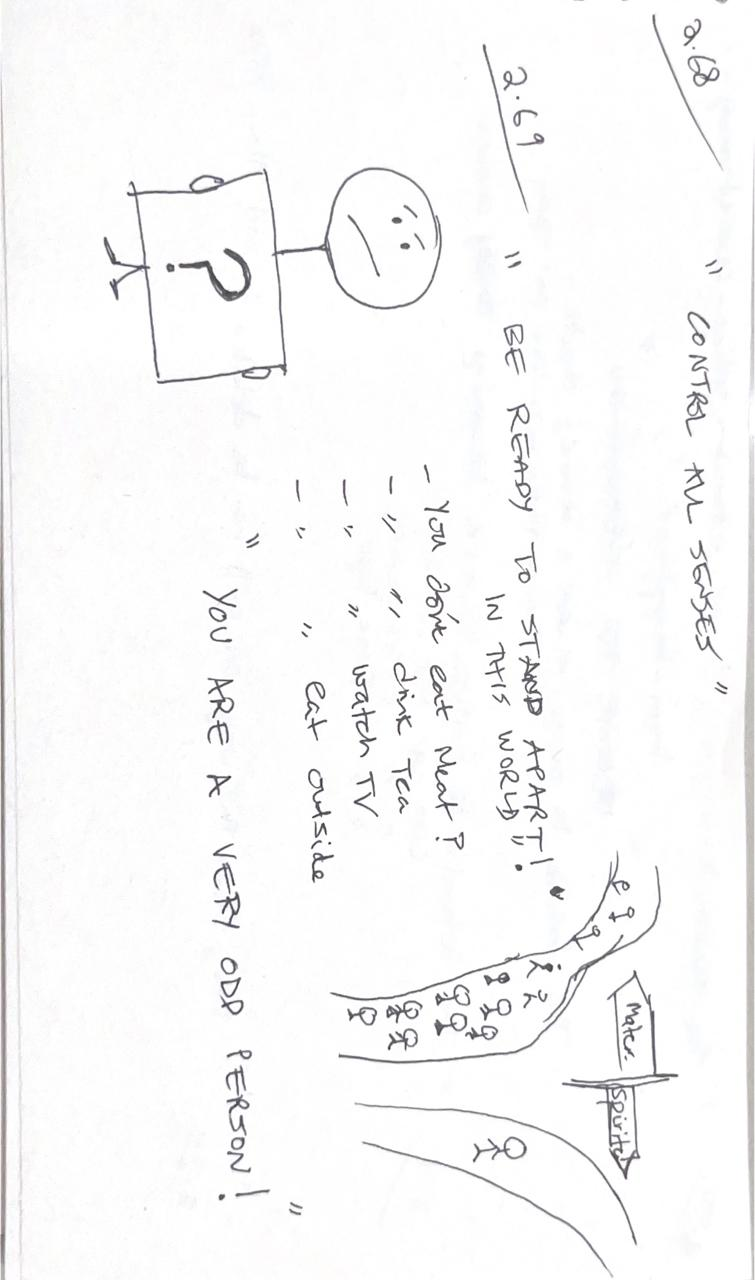BG.2
What is my DHARMA?
BG 2.7
What should I do in life? What matters?
Rest of BG is answer to this ONE question.
- Dharma (Right Activity) is FOUNDED in Right Identity - You are not the body but Spirit Soul.
- Cultivate Dutiful Detachment - Work in this world as a Duty but don't be attached to results. Perform all work as a Service to Krishna and offer him the results of work.
- Cultivate Inner Peace by engaging senses in the service of Krishna and in the end attain him (liberation).
DHARMA is ETERNAL - it is carried forward to NEXT LIFE and a LITTLE bit can save you from greatest DANGER
The Business of DHARMA TRILLION times more important than our DAILY business
FIVE step IMPLEMENTATION PLAN of the BIG PICTURE
Step#1 [FIVE step IMPLEMENTATION PLAN] You have a right to perform your prescribed duty, but you are not entitled to the fruits of action (2.47)
We are not the body but Spirit Soul. How to realize this most difficult aspect then? This starts with dutiful detachment.
This dutiful detachment comes in three 3️⃣ levels.
- I am not entitled to the fruit 🍍 of my work
- I am not the doer of my work
- I cannot stop doing my work just because I am not entitled to the fruit
1️⃣ I am not entitled to the fruit 🍍of my work
- When we work with a sole motive of getting and enjoying the result then our focus is on the result always. If we get the result we think we did it and become proud. When we don't get the result then we think we are not capable and become depressed.
- What should be my motivation to work then? To please Krishna through my work.
- What should I do with the result then? Offer it to Krishna.
Example
I work in an IT company. My vision towards work is:
- Krishna has arranged this job for me so that I get some money to live and perform Bhakti
- The company belongs to Krishna
- When I get one lakh rupee salary, I give it to Krishna fully - he recruited me. Then I request him for some money to run my home.
- If I work hard during the year and get increment I see it as mercy of Krishna and with gratitude continue to work without becoming arrogant and proud.
- If I work hard but the company terminates me, I see that also as mercy of the Lord and search for another job without getting frustrated and depressed.
- This overall vision of work purifies me because my focus is Krishna.
- MY Soul currently is covered with dirt - lust, anger, greed, pride, envy and illusion. Purification means dirt is removed by Krishna and then I can realize I am Soul and not the body.
2️⃣ I am not the doer of my work
- I am writing software code myself, then why Krishna is saying I am not the doer?
- Because I am not the ONLY doer, Krishna is the MAIN doer. How?
- Krishna provides me oxygen for example to live. If he does not do it then I will die in a moment.
- Krishna digests the breakfast that I eat in the ☕️ company cafetaria. If he does not digest then I will die in two days.
- Krishna gives me remembrance (mattah smruti jnanam apohanam) - I can recollect Java functions and frameworks.
- Krishna gives me permission to MOVE my fingers to write code (anumanta).
> This profound understanding makes it crystal clear why I need to give a good portion of my salary to Krishna. Serious practitioners of Bhakti Yoga give at least ten percent. Incidentally this is where 99 percent of devout Hindus falter - in offering the result to the Lord.
3️⃣ I cannot stop doing my work just because I am not entitled to the fruit
- If I am not entitled to the fruit and should give the fruit to Krishna, what is the point of working then? I will not work at all.
- No, if you don't work then you will not become purified. Why? Because purification is bestowed by Krishna when we do something for him. If we don't do anything then he will not do anything for us either.
Step#2- [FIVE step IMPLEMENTATION PLAN] Stay steady in both ups and downs so that you can keep KRISHNA always iin the FRONT (2.48)
- The second step in Bhakti is to remain calm in both ups and downs while we do our work in the world (karmanyeva adhikaraathe)
- Things are not in our control, there are other higher powers involved. Sometimes we will get success and sometimes failure. No body will get success all the time or failure all the time.
- Stay calm in both SO THAT YOU CAN KEEP KRISHNA IN THE FRONT OF YOUR LIFE at all times.
Example
- If my Manager appreciates me ik front of 100 people, fine I see it as the Lord's mercy and go on as usual. I don't let it go to my head and then start thinking I will now work over time and do more miracles to get more praise from my Manager.
- If my Manager fails to recognize my hard work, fine that is also the Lord's mercy. I will clarify with my Manager and go on with life as usual. I will not keep thinking about how bad my Manager is while chanting for the next three days. No.
- Basically both are not relevant - praise or otherwise. Both are temporary. Let me stay calm through both so that I can joyfully practice my Spiritual life.
Step#3- [FIVE step IMPLEMENTATION PLAN] Give up Selfish work and work for the pleasure of Krishna (2.49)
Step#4- [FIVE step IMPLEMENTATION PLAN] Bhakti is the PROPER way to do things (2.50)
Amidst our overscheduled and overworked lives, practicing bhakti may seem like another to-do that adds to our burden.
However, devotion is not another to-do. Why? Because it is not just a matter of external action; it is essentially a matter of inner redirection. It centers on reconceptualizing our identity and purpose.
Bhakti wisdom explains that we are souls who are parts of the whole, the all-attractive supreme Krishna. Our life is meant for establishing a loving connection with him and for making, in a mood of service to him, devotional contribution according to our abilities and resources. This mood of service brings inner stability amidst outer uncertainties.
Normally, we conceive of ourselves as controllers. Consequently, when we can’t control things, we get agitated. But if we understand that we are servants of Krishna, then, for his service, we may try to control and get things done. But even if we can’t, we can still stay fixed and secure in our spiritual identity: “I accept Krishna’s will and move on to my next service to him – if he wills, things will get done. Let me be diligent in doing what is in my control and be dependent on him for what is beyond my control.” This steady self-understanding decreases our vulnerability to external disturbances and increases our capacity to respond effectively.
The Bhagavad-gita (02.50) states that yoga is the art of doing work expertly. What is that expert way? Of working by being situated in our spiritual identity and purpose, being thus able to face life’s dualities with equanimity.
Therefore, rather than thinking of devotion of another to-do that burdens us, we can see it as another way to do – a way that unburdens us from being the controller and empowers us to contribute resiliently in a mood of service.
Step#5- [FIVE step IMPLEMENTATION PLAN] Perform Bhakti > Free yourself from results of work > Free yourself from cycle of birth and death > Go Back to Godhead (2.51)
By thus engaging in devotional service to the Lord, great sages or devotees free themselves from the results of work in the material world. In this way they become free from the cycle of birth and death and attain the state beyond all miseries [by going back to Godhead].
Karma-jam buddhi-yukta hi, dovetailing one’s Karma when one works with Buddhi, and what one does with this Buddhi? Phalam tyaktva manishinah, one gives up one’s attachment to the fruits. Such a person, Krishna says, is manishinah, one who has conquered the mind. What is the meaning of conquering the mind? Actually, the mind always looks for superficiality; it doesn’t see the deeper reality. The mind cannot think deeply, so in that case, there is a superficial level of thinking and living. But one who has conquered the mind can see the deep truths.
When a person becomes manishinah, when we are not attracted by external results but when one is attracted by deeper spiritual reality, then janma-bandha-vinirmuktah, we become freed from the cycle of birth and death, and padam gacchanty anamayam, then we attain the eternal result. What is that result?
The place which is free from misery. Maya is misery; anamayam is free from misery. So till now, Krishna has not talked about himself; he doesn’t explicitly say that it is His spiritual world. He simply says that is the abode that is free from misery, padam gacchanty anamayam. So when we will practice spiritual life in this way by staying detached from the fruits and by fixing the mind on spiritual reality, then one will attain the destination which is free from all misery.
What is the description of a person who is able to follow the above path of Dharma?
1- DEFINING CHARACTERISTIC - Seek Pleasure internally instead of externally (2.55)
Mind has three types of Feelings:
2- INTERNAL Pleasure results in EXTERNAL STEADINESS (2.56)


https://d.newsweek.com/en/full/2306216/plane-flying-over-motorway-cars.jpg
3- INTERNAL Pleasure results in "don't praise material pleasures or condemn material problems" (2.57)
This answers Arjuna's "How does a devotee speak?" questions
4- [WITHDRAWING SENSES] Maintain distance between Senses and Sense Objects (2.58)
- If you have food addiction, don't stock your Kitchen with Snacks, cold drinks etc
- If you have a Smoking addiction, don't keep a pack - buy one when you need
- If you have Porn addition, install Parental controls
- If you have shopping addiction - don't visit amazon.in and flipkart.in. Also don't visit Malls just for Window shopping
- If you have liquor addiction, don't stock in your fridge
[WITHDRAWING SENSES] Give up lower material sense pleasure with higher spiritual pleasure (2.59)
Two step process.
- 1- Although one gives up lower pleasure (abstain), still the desire for the pleasure remains (i cannot live without it)
- 2- Go after a positive higher pleasure which will offset the negative abstain
[WITHDRAWING SENSES] I will control senses MYSELF - I DO NOT NEED KRISHNA (2.60)
Reflecting the predicament of seekers who think wisely but act foolishly, the Bhagavad-gita (02.60) states: even those who are striving for self-mastery (yatato) and are discriminating (vipashcitah) find themselves overpowered by the wild senses (indriyani pramathini). The previous verse (02.59) points out the problem: stopping indulgence externally doesn’t remove the internal taste for that indulgence; instead, that taste drags us into indulgence, as this verse depicts. The solution is purification – changing our inner taste so that we delight in higher spiritual joys instead of lower material pleasures.
[WITHDRAWING SENSES] Fix the Mind and Senses on KRISHNA - this is the proven way to control senses (2.61)
- Firstly, it grants a higher fulfillment that makes lower sensual pleasures unappealing.
- Secondly, even if the lower taste remains, it gives the inner strength to resist the temptation.
Purport has practical explanation of how to engage mind and senses.
[WITHDRAWING SENSES] CONTROL senses else they MAKE YOU A RAPIST (2.62-63)
- Contemplation (dhyayato)
- Attraction (Sanga)
- Obsession (Kama) – I want it
- Irritation (Krodha) – Who can stop me? (Don’t have money. This is immoral. I don’t care). We often say when lust is unfulfilled or frustrated, it leads or explodes to anger, e.g., a love triangle. So here Krishna is talking about the action by which we fall away.
- Delusion (Sammoha) – Confused. Don’t know what to do. What should I do? What should I not do?
- Oblivion (Smriti-bhramashad) – Forgetfulness. So one doesn’t know what I should do. Delusion is undecided. So normally in this situation, we turn towards scripture, but in this stage, one is not able to turn towards scripture.
- Stupefaction (Buddhi-nasho)
- Destruction (Pramashyati) – One falls away.
Example: Alcoholic. Real-life incidents from Newspapers.
How to engage senses in this world filled with temptation?
BG 2.64 to BG 2.71 answers Arjuna's "Kim Vrajeta?" - how does a Devotee move about in this world?
[ENGAGE SENSES] Stop listening to your Mind - listen to Shastra and MERCY OF KRISHNA (2.64)
How will we get Higher taste? Yukta Asita. Gradual process.
- Keep aside your personal likes and dislikes
- Instead, follow Shastra
- Get purification, higher taste and mercy of the Lord
There are certain things that we may like or dislike, but we have to put them aside so that we can move towards something that is better. For example, a small child may like to play and dislike studying. This doesn’t mean that the child should only play or only study. Instead, the child should find a proper balance between the two.
In the same way, raga-dvesha-vimuktais tu means that we should put aside attachment and aversion by following the scriptures. The scriptures do not ban all the things that we like to do, but only those things that are harmful for us. By giving these things up, we become purified and we keep ourselves out of trouble.
If there is an electrical fence around a building and our treasure is within that building, and we are also inside that building, then we will see the fence as our protection. But if we think that everything we want is outside the building, then the fence will look like deprivation.
Ultimately, it depends on what our goal is. If our goal is material sense enjoyment, then all the rules and regulations in Krishna consciousness will look like deprivation. But if we understand that our goal is devotional service and our goal is to develop Krishna prema, or love for Krishna, then the fence or the rules and regulations act as protection.
Regulative principles for freedom mean that we will be freed from things that will deviate us from Krishna. Our treasure is inside, and the things outside are distractions. If we think that everything for our enjoyment is outside, then the fence is a restriction and we don’t want it. But if we think that our goal is Krishna prema, then the fence and the rules and regulations act as protection. Regulative principles for liberation are meant to free us from distractions from Krishna.
[ENGAGE SENSES] When we get MERCY of KRISHNA then all miseries caused by Senses STOP (2.65)
Though such sufferings can have many specific causes, they frequently have an underlying common cause: impure desire. Gita wisdom explains that we are eternal souls meant to delight in pure immortal love for the supreme spiritual being, God, Krishna. Impurity makes us seek pleasure in temporary material things. As long as we crave for temporary things, those cravings become the cause of our suffering, either when the craved-for objects go away or when the craving makes us do karmically culpable things.
Pertinently, the Bhagavad-gita (02.65) declares that misery is destroyed for those who attain mercy. When we practice yoga, especially bhakti-yoga, we learn to redirect our desires from temporary things to Krishna, and he reciprocates with our sincere practice by bestowing his mercy on us. A prominent manifestation of his mercy is purity, which eliminates the misery-inducing craving for temporary things. Thus, his mercy empowers us to rise from the level of consciously striving to redirect our desires towards him to the level of being spontaneously attracted to him. Consequently, our consciousness becomes increasingly raised above the material level of reality and its associated miseries. And ultimately we become liberated from material existence into Krishna’s ecstatic world of love.
[ENGAGE SENSES] Without KRISHNA's MERCY => No stead mind => No Peace => No happiness (2.66)
Unless there is a basic level of peace, there cannot be happiness. Peace comes when our mind and intelligence are focused. If we are not in KC (Krishna consciousness), then the subtle body is not fixed. The mind and intelligence go here and there at such a pace that we lack steadiness, resulting in no peace. Na cabhavayatah santir, this peace is not merely external (it doesn’t mean that devotees have no anxiety or are living on a riverside in the jungle), but it is internal. It means knowing my goal and working towards it, making conscious choices about what I will do and what I will not do. Although a devotee may desire external peace as well, it is to ensure uninterrupted endeavor in KC.
[ENGAGE SENSES] Control all Senses - Even ONE uncontrolled sense with drag the mind and intelligence (2.67)
One Situation. One Sense. One Temptation is sufficient to Smother us.
[ENGAGE SENSES] Therefore - CONTROL ALL SENSES and become STRONG (2.68)
[ENGAGE SENSES] Be ready to be an ODD ball in this world (2.69)
While answering this sub-question, Krishna emphasizes that though spiritualists move about in the world, they don’t let their senses roam randomly (02.68); otherwise, such roaming can be the cause of delusion, degradation, destruction (02.67). Krishna’s emphatic directive raises an understandable concern: Most people routinely dwell on, even delight in, tempting objects — staring at them, fantasizing about them, gossiping about them. Won’t that make spiritualists who abstain from similar action be the odd people in society? Acknowledging this reality, this verse (69) underscores how spiritualists (have to) stand apart from most of the world — in terms of their defining values and their driving purposes, they will be as different from those of materialistic people as day is from night.
[ENGAGE SENSES] Be ready to be an ODD ball in this world (2.69)
The readiness to stand apart from the world, as conveyed in this Bhagavad-gita verse (02.69), is central to the Gita’s practical application. The Gita’s message centers on providing a higher, spiritual vision of our place and purpose in the world.
[ENGAGE SENSES]The formula to engage senses and becoming attaining SHANTI - Inner Spiritual happiness like an OCEAN (2.70)
But won’t functioning among such materialists subject spiritualists to temptation? The next verse (70) answers: spiritualists, by their realization of higher realities, are so internally full and fulfilled that tempting stimuli can flow into their consciousness without actually tempting them — and thus they can attain lasting peace.
[ENGAGE SENSES] The formula to engage senses and becoming attaining SHANTI - GIVE UP a) Material desires b) Possessiveness and c) False ego (2.71)
One who gives up material desires, moves around in this world without any possessiveness and false ego, will attain happiness.
So, basically, one has to understand that I am a soul and I move in this world for the sake of yoga, not for anything in this world. ‘Sa santim adhigacchati’ -> such a person will attain happiness.
[ENGAGE SENSES] Having attained SHANTI like this one will not be deluded and will attain KRISHNA (2.72)
Being spiritually situated in this manner has two results. First, one will not be deluded again (“nainam prapya vimuhyati”). Second, if one is situated like this at the time of “anta-kale ‘pi,” then they will attain liberation. This is the first reference in the Gita to the significance of “Anant Kal,” having special consciousness at the time of death. We must strive to attain that consciousness more in Chapter 8. This is a prelude.

